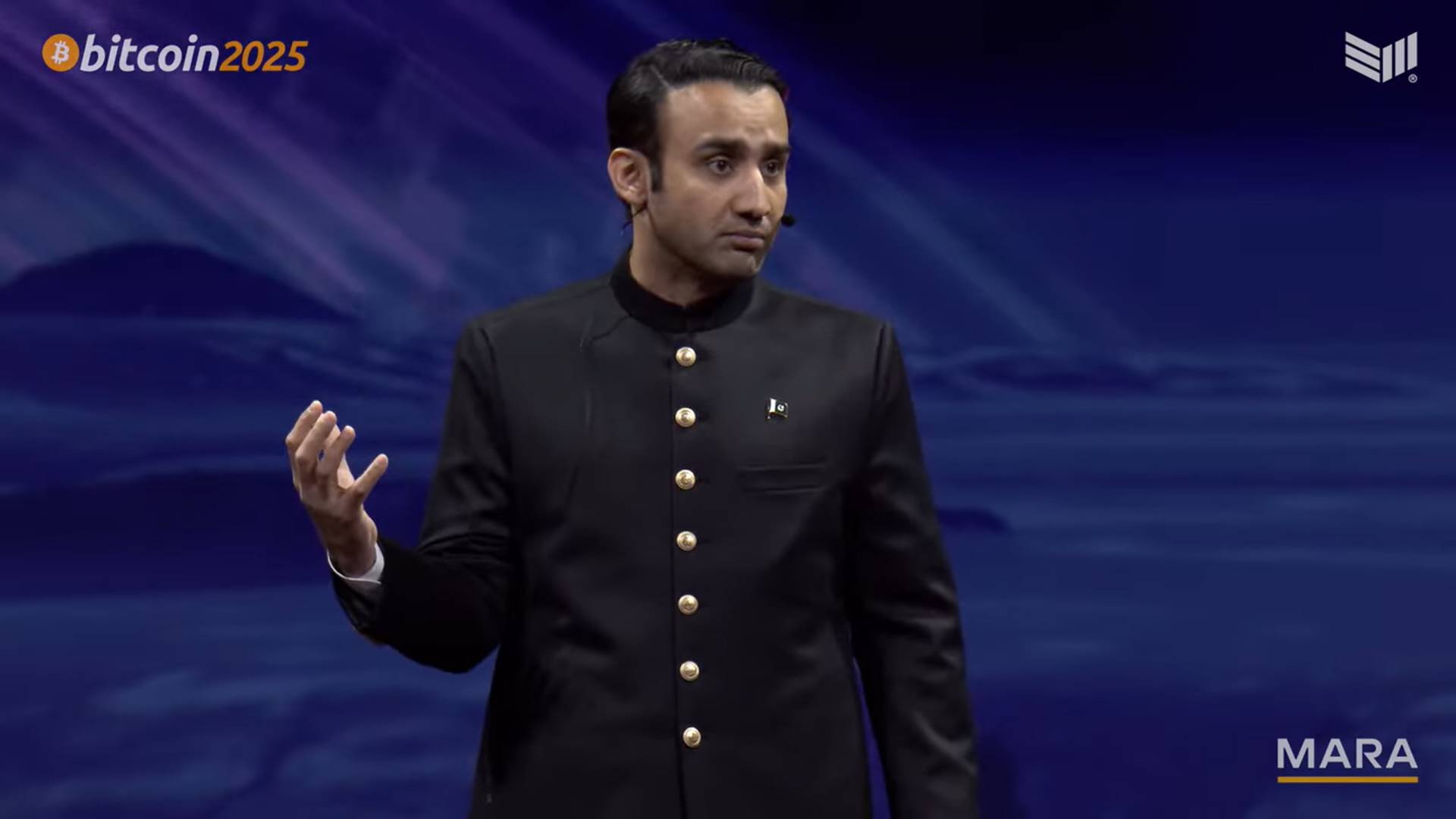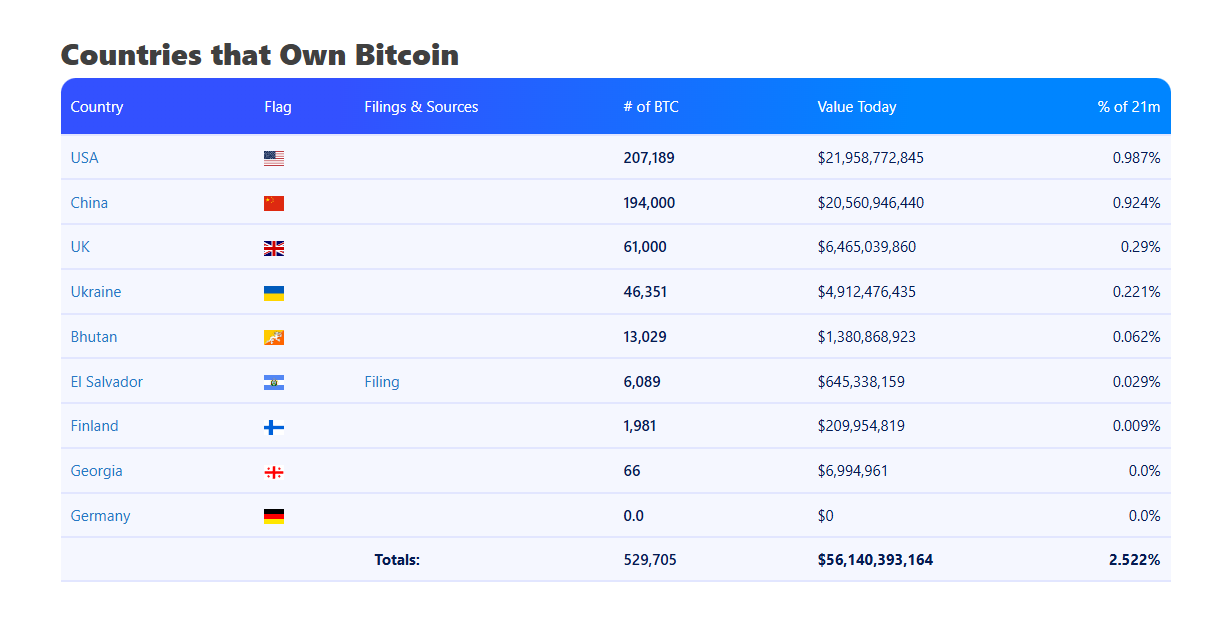Small countries are trying to find their place in the global financial system through Bitcoin.
Written by: Luke, Mars Finance
On the global financial stage, Bitcoin is no longer just a "toy" for investors but is gradually becoming part of national strategies. In May 2025, a chart titled "Countries Holding Bitcoin" circulated online, revealing the holdings of Bitcoin by various countries: the United States ranks first with 207,189 coins, worth nearly $2.2 billion; China follows closely with 194,000 coins; small countries like Bhutan and El Salvador are also on the list, holding 13,029 and 6,089 coins, respectively. A total of 529,705 Bitcoins are held by governments worldwide, accounting for 2.522% of the total Bitcoin supply. However, one notable absence from the chart has sparked recent discussions—Pakistan. This South Asian country announced the establishment of a national-level Bitcoin strategic reserve and pledged to "never sell." This move not only places Pakistan at the forefront of cryptocurrency but also raises the question: why are more and more small countries so eager to embrace Bitcoin?

Pakistan's Bitcoin Ambitions: From Energy to National Reserves
Pakistan's Bitcoin strategy has begun amidst much fanfare. In May 2025, at the "Bitcoin 2025" conference held in Las Vegas, U.S., Bilal Bin Saqib, special assistant to the Pakistani government and advisor on blockchain and cryptocurrency affairs, announced that Pakistan would establish a national-level Bitcoin strategic reserve, following the example of the United States by holding these assets long-term. The inspiration for this plan is clear: the U.S. government holds 207,189 Bitcoins, valued at approximately $2.196 billion, accounting for 0.987% of the total Bitcoin supply, becoming a "benchmark" for many countries. Although the specific scale of Pakistan's holdings has not been disclosed, its ambitions are evident.
Pakistan's Bitcoin strategy goes beyond mere reserves. The government also announced the allocation of 2,000 megawatts of surplus electricity for Bitcoin mining and artificial intelligence data centers. This initiative directly addresses the country's energy pain points: coal-fired power projects like Sahiwal and Qasim Port are currently operating at only 15% capacity, resulting in significant electricity waste. Through mining, Pakistan hopes to convert this "idle energy" into economic value. At the current Bitcoin price (approximately $106,000 per coin), mining one Bitcoin could bring substantial revenue to the country. More importantly, this plan has attracted the attention of foreign investors, with the government offering tax incentives to attract several mining company delegations.
Meanwhile, Pakistan's digital asset management framework is also being rapidly improved. On May 22, 2025, the Pakistan Digital Asset Management Authority (PDAA) was officially established to regulate cryptocurrency trading, DeFi applications, and asset tokenization, while promoting the application of blockchain technology in government affairs, land records, and finance. The establishment of the PDAA was proposed by the Pakistan Cryptocurrency Committee, which includes former Binance CEO Zhao Changpeng as an advisor, injecting international experience into policy formulation. The PDAA is also tasked with promoting the tokenization of government bonds and supporting Web3 startups, aiming to position Pakistan as a crypto hub in South Asia.
Pakistan's crypto user base is also noteworthy. By 2025, the number of crypto users in the country is expected to exceed 27 million, accounting for over 10% of the total population (247 million). This figure not only reflects the enthusiasm of the young population for digital assets but also provides public support for the government's push for a crypto economy. From energy to policy to user base, Pakistan's Bitcoin strategy is advancing on multiple fronts.
The Bitcoin Craze of Small Countries: From Bhutan to El Salvador
Pakistan is not alone. Globally, small countries have been actively exploring the Bitcoin space. Bhutan, a small country at the foot of the Himalayas, has become an "invisible player" in Bitcoin mining due to its abundant hydropower resources. According to the latest data, Bhutan holds 13,029 Bitcoins, valued at approximately $138 million, accounting for 0.062% of the total supply. These Bitcoins have been accumulated through mining by the state-owned enterprise Druk Holdings, with low hydropower costs giving Bhutan a competitive edge in mining.

El Salvador, on the other hand, is a pioneer in the Bitcoin strategy among small countries. In 2021, this Central American nation became the first in the world to adopt Bitcoin as legal tender and has continued to increase its reserves. As of May 2025, El Salvador holds 6,089 Bitcoins, valued at approximately $64.53 million, accounting for 0.029% of the total supply. The unrealized profits from its Bitcoin reserves have reached $357 million, demonstrating the returns from price increases. However, El Salvador's Bitcoin journey has not been smooth. The International Monetary Fund (IMF) reached a $1.4 billion loan agreement with it in December 2024, but required the country to maintain its existing reserve levels and amend the "Bitcoin Law" to remove the mandate for the private sector to accept Bitcoin. The IMF's cautious stance reflects another side of Bitcoin: it is both an opportunity and a potential financial risk.
Ukraine's Bitcoin holdings bear the marks of war. During the Russia-Ukraine conflict, Ukraine raised over $100 million in funding through cryptocurrency donations, becoming a significant source of its 46,351 Bitcoins (valued at approximately $491 million). Ukraine's crypto policy is relatively open, attracting numerous Web3 startups, with its Bitcoin holdings accounting for 0.221%, ranking among the top for small countries.
In contrast, Georgia's 66 Bitcoins (valued at approximately $6.99 million) seem insignificant, possibly representing a symbolic holding from early confiscated assets, without a clear national strategy.
Why are Small Countries Enthusiastic About Bitcoin? The Interplay of Economics and Geopolitics
The embrace of Bitcoin by small countries is driven by a complex interplay of economic, geopolitical, and technological factors. Firstly, Bitcoin is seen as a tool to hedge against economic difficulties. Many small countries face pressures from insufficient foreign exchange reserves, inflation, or high debt levels. For example, El Salvador's public debt exceeds 90% of its GDP, and Pakistan also bears a heavy debt burden. The volatility of traditional financial markets—such as falling stock prices and low bond yields—has led these countries to seek Bitcoin as an alternative asset. Its decentralized nature allows it to be insulated from the monetary policies of any single country, especially under a dollar-dominated financial system, providing small countries with a potential means to enhance economic autonomy.
Secondly, energy utilization is a direct driver of small countries' Bitcoin strategies. Bhutan's hydropower mining and Pakistan's 2,000 megawatt electricity allocation plan are similar in nature. Many small countries possess underutilized renewable energy or surplus electricity; Bitcoin mining can not only monetize these resources but also attract international mining companies and tech firms. If Pakistan's coal projects can operate at full capacity through mining, it could not only reduce electricity waste but also potentially bring substantial foreign exchange income to the country.
Furthermore, Bitcoin policies serve as a "magnet" for attracting foreign investment. Amid the global Web3 and blockchain boom, small countries are attracting startups and capital inflows through lenient crypto policies. Ukraine's crypto ecosystem has nurtured several Web3 startups, and Pakistan's PDAA aims to support startups as a goal. This strategy not only brings direct investment but also promotes technology transfer and job growth.
Finally, geopolitical considerations play an important role in the Bitcoin strategies of small countries. In a dollar-dominated international financial system, small countries often find themselves in a passive position. The decentralized nature of Bitcoin makes it a potential "financial weapon," helping small countries gain more voice in global power plays. Pakistan has explicitly stated that its Bitcoin strategy is inspired by the U.S. reserve plan, and the Bitcoin reserve policy promoted by the Trump administration in 2025 has further encouraged other countries to follow suit.
Comparison of Major and Minor Countries: From Seizures to Strategic Holdings
Unlike small countries, the Bitcoin holdings of major countries often come from law enforcement seizures. The 207,189 Bitcoins held by the U.S. primarily stem from assets seized in the Silk Road case by the FBI; China's 194,000 Bitcoins also come from illegal asset confiscations; the UK's 61,000 Bitcoins are largely the result of law enforcement actions. The Bitcoin holdings of these major countries resemble "windfalls" rather than proactive strategies.
Small countries, on the other hand, tend to accumulate Bitcoin through mining or policy purchases. Bhutan's 13,029 Bitcoins come from hydropower mining, while El Salvador's 6,089 Bitcoins are a product of national strategy. Although part of Ukraine's 46,351 Bitcoins comes from donations, it also reflects its proactive embrace of cryptocurrency policies. While the proportion of Bitcoin holdings among small countries is low (totaling 2.522%), their strategic significance is greater, aiming to achieve economic diversification or hedge against risks through Bitcoin.
Notably, Germany emptied its Bitcoin reserves (approximately 50,000 coins) in 2024 to repay debts. This move sharply contrasts with the long-term holding strategies of small countries and reflects the divergence in Bitcoin policies among major countries.
IMF Scrutiny and Small Countries' Persistence
The path for small countries embracing Bitcoin is not without challenges, as the scrutiny of the International Monetary Fund (IMF) looms large. El Salvador's case is the most representative. In December 2024, the IMF reached a $1.4 billion loan agreement with El Salvador but required it to maintain its existing Bitcoin reserve levels and amend the "Bitcoin Law" to remove the mandate for the private sector to accept Bitcoin. The IMF warned that Bitcoin reserves could exacerbate El Salvador's debt risks. Nevertheless, El Salvador has shown strong performance in economic reforms, securing the next $120 million loan from the IMF.
Pakistan's situation is more forward-looking. Its Digital Asset Management Authority (PDAA) emphasized compliance with the Financial Action Task Force (FATF) regulatory standards from the outset, attempting to gain policy space under the IMF's scrutiny. Pakistan's crypto policy is not limited to Bitcoin reserves but also includes the broad application of blockchain technology in government affairs and finance, which may provide it with greater flexibility in negotiations with the IMF.
The IMF's cautious stance reflects the dual nature of Bitcoin: it is both an opportunity for small countries' economic transformation and a potential threat to financial stability. As small countries embrace Bitcoin, they must find a balance between innovation and compliance.
Pakistan's Unique Advantages and Challenges
Compared to other small countries, Pakistan's Bitcoin strategy has its uniqueness. Firstly, its demographic dividend and crypto user base provide vast market potential. With 27 million crypto users, it not only represents a consumer group but also a driving force for blockchain technology innovation. Secondly, Pakistan's energy resources and geopolitical position make it a potential crypto hub in South Asia. The 2,000 megawatt electricity allocation plan not only absorbs surplus energy but could also attract investments from mining companies in the Middle East and China.
However, challenges are also significant. Pakistan's power infrastructure is aging, and coal projects may face environmental pressures. Additionally, the volatility of the cryptocurrency market could pose a threat to the value of its reserves. While El Salvador's Bitcoin reserves have yielded profits of $357 million, they have also faced the test of severe price fluctuations. More importantly, Pakistan needs to cautiously advance its policies under the IMF's regulatory framework to avoid constraints on loan conditions.
Conclusion: The Bitcoin Gamble of Small Countries
Pakistan's Bitcoin strategy is a microcosm of small countries embracing the digital economy. From Bhutan's hydropower mining to El Salvador's legal tender experiment, and Ukraine's wartime donations, these countries see hope for economic revival in the wave of Bitcoin. Bitcoin is not just an asset; it is a convergence point of energy, technology, and geopolitics. Through Bitcoin, small countries are trying to find their place in the global financial system.
However, this gamble is not without risks. The volatility of Bitcoin, the regulatory pressures from the IMF, and infrastructure limitations could thwart the ambitions of small countries. But as Bilal Bin Saqib said at the "Bitcoin 2025" conference: "Once misunderstood, now unstoppable." For Pakistan and countless small countries, Bitcoin is not just an asset; it is a belief—that in the future of the digital economy, they do not wish to be absent.
免责声明:本文章仅代表作者个人观点,不代表本平台的立场和观点。本文章仅供信息分享,不构成对任何人的任何投资建议。用户与作者之间的任何争议,与本平台无关。如网页中刊载的文章或图片涉及侵权,请提供相关的权利证明和身份证明发送邮件到support@aicoin.com,本平台相关工作人员将会进行核查。




